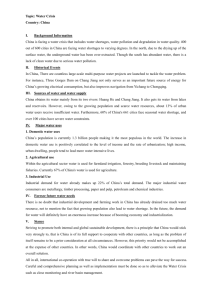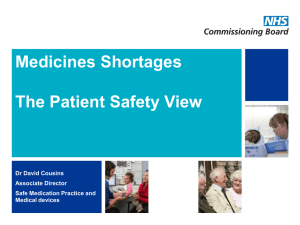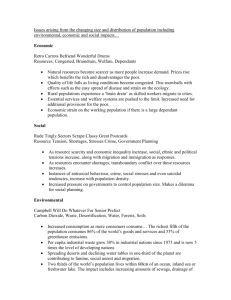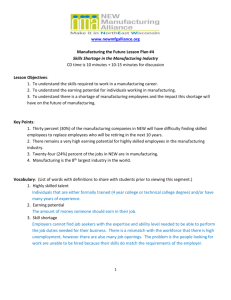Notification and management of medicines shortages, best practice
advertisement
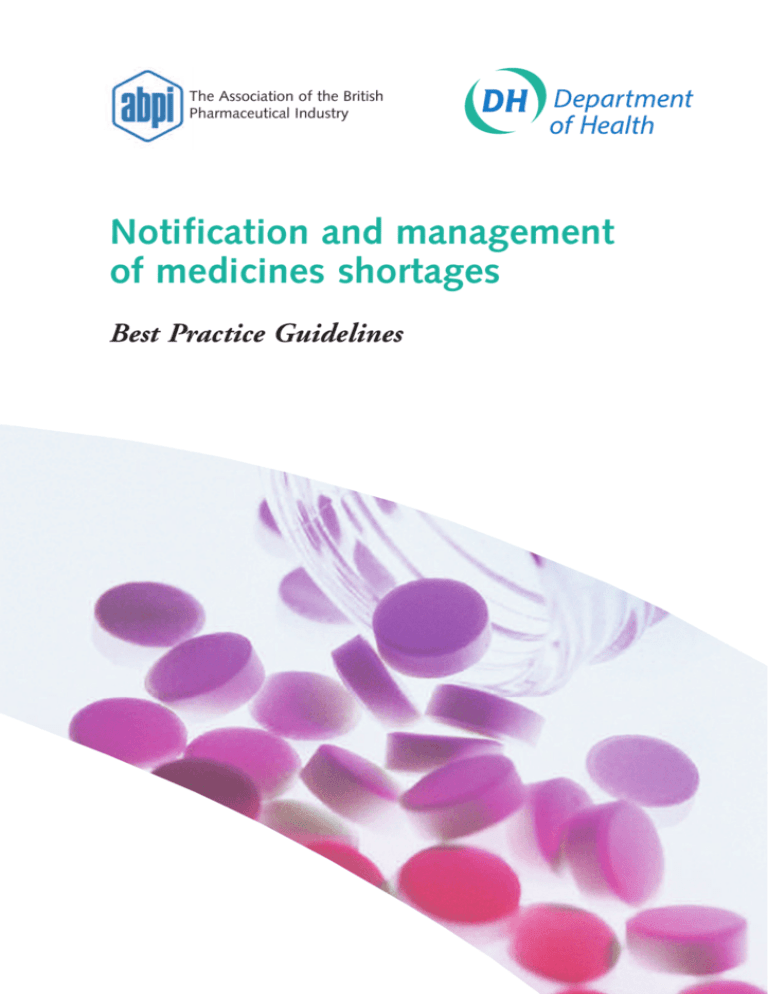
The Association of the British Pharmaceutical Industry Notification and management of medicines shortages Best Practice Guidelines Notification and management of medicines shortages Best Practice Guidelines January 2007 Foreword Every day millions of NHS patients rely on medicines supplied by the pharmaceutical industry. Thanks to the hard work of all those in the supply chain – manufacturers, wholesalers and pharmacists – patients receive the medicines they require. Sometimes, there are minor supply problems, often unnoticed by patients and clinicians. Occasionally, despite the best efforts of all those concerned, supply problems can affect patients. The Department of Health (DH) and the pharmaceutical industry are committed to working together to tackle these problems. This is why the DH and the Association of the British Pharmaceutical Industry (ABPI) have produced these best practice guidelines, which are designed to help minimise the impact of any medicine shortage. They recommend that companies communicate with the DH as soon as possible about impending shortages that are likely to have an impact on patient care. This early exchange of information will enable the DH and the industry to work together to explore the options for managing the shortage and will allow time to make contingency arrangements where necessary. Companies are encouraged to nominate a member of staff to have overall responsibility for supply issues, and to act as a contact point. The DH also has a nominated contact point, and an electronic mailbox has been set up to facilitate communication. We hope that companies will choose to adopt these guidelines and we look forward to continuing to work together in ensuring that patients get the best possible treatment in the NHS. ANDY BURNHAM Minister of State Department of Health NIGEL BROOKSBY President, ABPI 1 Notification and management of medicines shortages Introduction Medicines shortages have become increasingly common over the last few years. There are many reasons why a medicine might go out of stock. These include: • Manufacturing problems • Supply/demand problems • Raw material problems • Regulatory problems. Each supply problem has its own characteristics and has to be dealt with on an individual basis. It is important that all stakeholders work together to ensure that a shortage of a product does not cause unnecessary problems for patients and prescribers. These guidelines have been drawn up jointly by the Department of Health (DH) and the Association of the British Pharmaceutical Industry (ABPI). They are voluntary, and complement the statutory requirement to inform the Licensing Authority of any disruptions to supply under European Medicines Legislation (Directive 2001/83/EC as amended) – see Paragraph 7 of these Guidelines. 2 Best Practice Guidelines 1. Designated person to deal with supply issues within companies Each company should nominate a person, with a designated deputy, as a contact point for supply issues. Nominated persons should be responsible for notifying the DH of potential shortages under these guidelines. He/she should be sufficiently senior to have an overview of the supply situation for any particular product. 2. Designated person at DH to deal with supply issues Companies informing the DH of product shortages should provide the information set out in the pro-forma at the end of these guidelines, which includes the contact details for the DH. The pro-forma can be downloaded from the DH and ABPI websites. If the problem is urgent, companies should first make contact with the DH by telephone, and follow this up with an e-mail message. There is a dedicated DH Mailbox for notification of shortages. The DH will acknowledge this communication. 3. Written procedures Each company should develop its own internal written procedures for avoiding, identifying and dealing with product shortages. These procedures should include the following: • Internal measures to avert potential shortages • Monitoring mechanisms to identify potential shortages • Procedures for communication with the DH, and in addition, for those products included in secondary care contracts, the NHS Purchasing and Supply Agency (PASA) • Procedures for managing shortages should they arise. They may also include outline strategies for communication with the NHS in the event of a shortage. 4. Notification of shortages to the DH Companies should warn the DH if they anticipate a product shortage that is likely to impact on patient care. If secondary care contract products are involved, companies should also inform PASA. Any information supplied to the DH/PASA will be treated as completely confidential, and the DH/PASA will not take any action which might jeopardise the commercial business of a company. The DH or PASA will not approach competitors or other stakeholders unless otherwise agreed by the company concerned. 3 Notification and management of medicines shortages The decision to advise the DH of an actual or potential shortage, and when to do so, is the responsibility of the company. A key deciding factor is whether the shortage is likely to have a direct impact on patients. In addition, the following should be taken into consideration: • How imminent the shortage is • The expected duration of the shortage • Whether alternatives are available, and the market share of the affected product. The DH will inform companies if it becomes aware of supply problems relating to their products that may have an impact on patient care. 5. Management of shortages Companies should take steps to minimise the effect of any supply problem. The DH and PASA, in conjunction with the Medicines and Healthcare products Regulatory Agency, may be able to help in this process, by, for example: • Expediting regulatory procedures for products deemed critical • Providing information to companies to help manage supplies of existing stocks • Identifying sources of product from abroad, and expediting import for individual patient use • Identifying NHS manufacturing units with capacity and ability to meet demand • Advising on and facilitating communication with the NHS. 6. Communication strategy In the event of a shortage, companies need to decide whether communication with the NHS is necessary, and if so, what format it should take. Such communication plans should be shared with the DH. 7. European Medicines Legislation Articles 23a and 81 of Directive 2001/83/EC (as amended) relate directly to the supply of medicines, and require marketing authorisation holders – within the limits of their responsibilities – to maintain appropriate and continued supplies of their products, and to notify the Licensing Authority if a product is not going to be available either temporarily or permanently. The legislation requires two months notice in all but exceptional circumstances. In addition to this requirement, companies should ensure that the DH is notified as soon as possible of any potential shortages that are likely to have an impact on patient care. 4 Pro-Forma for notification of product shortages Information required Company details Company name: Company contact: Contact telephone number: Contact fax number: Contact e-mail address: Product details Product name: Licensed/ unlicensed uses: Presentation: Presentations remaining: Reason for shortage Manufacturing difficulties ( yes / no ) Regulatory problems ( yes / no ) Raw material problems ( yes / no ) Other ( yes / no ) Further details of shortage: Expected duration of shortage: Steps taken/planned to address shortage: Licensing Authority advised (yes/no) Form completed by: See over for contact details. Date: 5 Notification and management of medicines shortages Contact details Department of Health F.A.O. Mrs Isabelle Izzard Principal Pharmacist Medicines, Pharmacy and Industry Group 456D Skipton House 80 London Road London SE1 6LH Tel: 020 7972 2913 Fax: 020 7972 2932 E-mail: isabelle.izzard@dh.gsi.gov.uk Mailbox: Brandedmedicineshortages@dh.gsi.gov.uk In addition, for products affecting secondary care contract items: NHS Purchasing and Supply Agency F.A.O. Howard Stokoe Principal Pharmacist Premier House 60 Caversham Road Reading RG1 7EB Tel: 0118 980 8850 Fax: 0118 980 8853 E-mail: howard.stokoe@dh.gsi.gov.uk 6 © Crown copyright 2006 Produced by COI for the Department of Health 278301 1p 800 Dec06 (XXX) Copies available from: Department of Health Medicines, Pharmacy and Industry Group 456D Skipton House 80 London Road London SE1 6LH Tel: 020 7972 2913 Fax: 020 7972 2932 Email: isabelle.izzard@dh.gsi.gov.uk Copies can also be downloaded from www.dh.gov.uk/medicinesshortages www.abpi.org.uk
